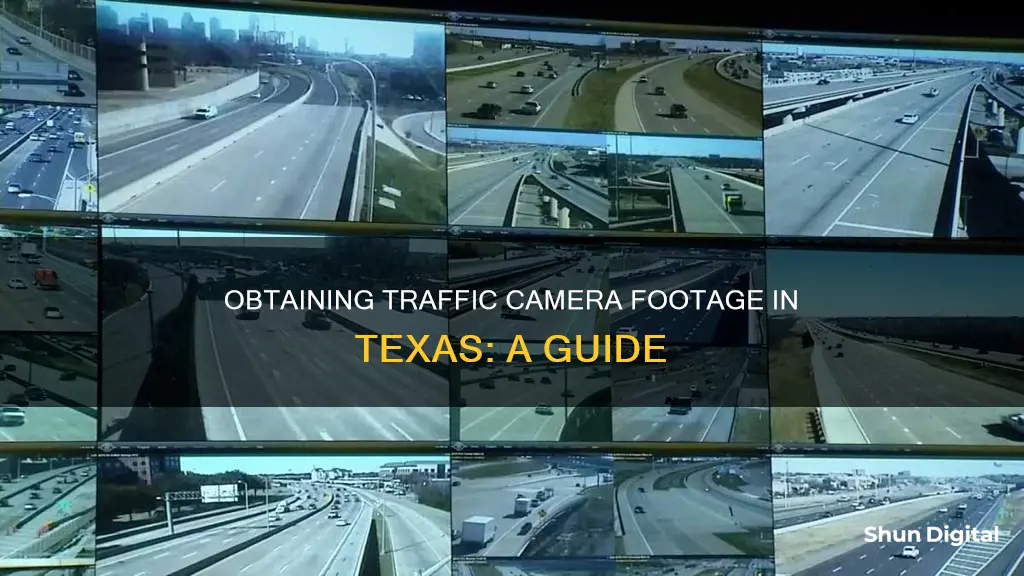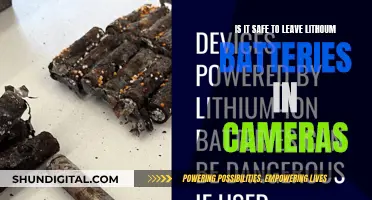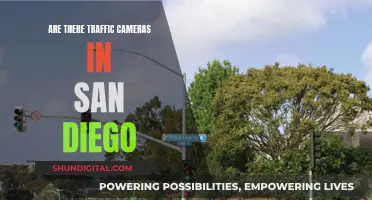
If you've been in a road traffic accident in Texas, you may be wondering how to obtain traffic camera footage. This can be a crucial step in determining liability and seeking compensation for any harm suffered. Most traffic cameras in Texas are publicly owned and operated by the Department of Transportation, but there may also be privately-owned cameras nearby, such as dashboard cameras or business security systems. Obtaining this footage can be challenging, and you may need to hire an experienced car accident lawyer to assist you in navigating the process and issuing subpoenas. It's important to act quickly, as footage may be erased after a certain period.
| Characteristics | Values |
|---|---|
| How to obtain traffic camera footage | Identify the owner of the camera and request the footage. If the owner refuses, a lawyer can help to subpoena the footage. |
| Who owns the cameras? | Cameras could be owned by local government entities, transportation departments, or private individuals or organizations. |
| How to request footage | Requests must be made in writing and include your name, contact information, and a clear description of the records you are requesting. |
| Timeframe | It is important to act quickly as footage may be erased or overwritten after a certain period. |
What You'll Learn

Identify camera owners
In Texas, traffic cameras are typically owned by the state and operated by the Department of Transportation. However, there are also privately-owned cameras that belong to private individuals or organisations. These can include anything from dashboard cameras to business security systems.
Since the Texas Legislature banned the use of traffic and red-light cameras in 2019, it is unlikely that you will be able to obtain traffic camera footage from a city or municipality. However, some cities may have been able to keep their cameras running due to a provision in the law that allowed them to finish their existing contracts.
To identify the owner of a traffic camera, you can refer to the Texas Department of Transportation (TxDOT)'s list of traffic cameras in several metropolitan areas across the state. Alternatively, you can seek the help of an attorney who can subpoena the footage. They will know who to contact, what to ask for, and how to make an effective request.
It is important to note that even if you identify the camera owner, they may not be obligated to provide you with the footage, especially in the case of privately-owned cameras. Obtaining traffic camera footage can be a complex process, and it is recommended to seek legal assistance if you require the footage for a car accident claim or other legal purposes.
Hanging Angelcare Camera: A Guide for Bassinets
You may want to see also

Request footage from private owners
Requesting Footage from Private Camera Owners in Texas
If you're seeking traffic camera footage in Texas, it's important to identify the owner of the camera. While most traffic cameras are publicly owned, there could also be privately-owned cameras that captured the incident, such as dashboard cameras or business security systems.
- Identify the Camera Owner: Determine who owns the private camera. This could be an individual, a business, or an organization.2.
- Contact the Owner Directly: The simplest way to obtain footage is often just to ask for it. Contact the camera owner and request a copy of the footage. The owner may agree to provide it to you upon request.
- Understand Privacy Laws: Texas law allows the use of surveillance cameras for personal and business security. However, there are laws dictating where cameras can be placed and where their use is prohibited to respect the privacy of individuals. Be mindful of these laws when requesting footage, especially if it involves cameras in private areas.
- Consider Obtaining Legal Assistance: If asking for the footage doesn't yield results, you may need to involve an attorney. They can help you subpoena the footage by requesting the court to order the owner to turn it over.
- Be Mindful of Timing: Keep in mind that there may be no legal obligations regarding how long private entities hold onto surveillance footage. While there are no specific Texas laws on this matter, some organizations advise storing footage for no more than 30 days unless it is required for an ongoing investigation. Therefore, act promptly when requesting footage.
- Provide Clear Information: When making your request, be sure to provide clear information about the incident, including the date, time, and location. This will help the camera owner identify the relevant footage more easily.
- Understand Data Access in Texas: In Texas, various entities beyond law enforcement, such as landlords, private businesses, and homeowners' associations, may have broad access to surveillance footage. Be aware that your request for footage may not be the only attempt to access the data.
Crafting Polaroid Cameras: The Intricate Manufacturing Process
You may want to see also

Subpoena footage from non-compliant owners
Obtaining traffic camera footage in Texas can be a complex process, especially when dealing with non-compliant owners. Here are some detailed steps to guide you through the process of subpoenaing footage from non-compliant owners:
Identify the Camera Owner:
Firstly, it is crucial to determine who owns the camera. Traffic cameras could be owned by a local government entity, a transportation department, or a private individual or organization. Identifying the owner is essential for the next steps.
Send a Preservation Letter:
Time is of the essence when requesting traffic camera footage. Act quickly and send a preservation letter to the camera owner. This letter should include the names and contact information of all involved parties, details of the accident, a description of the footage you're seeking, and a formal request to preserve the specific footage by not deleting, destroying, or altering it.
Hire an Attorney:
Engaging the services of an experienced car accident attorney is highly recommended. They can guide you through the legal process and improve your chances of obtaining the footage. Your attorney will help you navigate the complexities of dealing with non-compliant owners.
File a Lawsuit and Subpoena the Footage:
To obtain the traffic camera footage, you must file a lawsuit against the other driver. Your attorney will then request a subpoena from the court. A subpoena is a court order sent to the camera owner, compelling them to turn over electronic records, including surveillance video recordings. The court can force the owner to provide the footage.
Submit the Subpoena:
After obtaining the subpoena from the court, submit it to the court clerk. Once the judge signs the subpoena, it will be delivered to the camera owner by a neutral party, such as a process server. The camera owner will then be legally required to respond by either providing the footage, objecting to the subpoena, or requesting more time.
Prove Lawfulness and Authenticity:
Once you have obtained the surveillance footage, your attorney can assist in proving that it was acquired lawfully and is relevant to your case. They can also help you understand whether the footage strengthens your case and prepare you for any challenges the insurance companies may present.
Remember, the process of obtaining traffic camera footage in Texas can be challenging, especially when dealing with non-compliant owners. It is always advisable to seek legal assistance to protect your rights and improve your chances of obtaining the evidence you need.
iMac's Built-In Camera: What You Need to Know
You may want to see also

Find alternative sources of footage
Traffic camera footage can be pivotal in a car accident claim, offering clear, unbiased proof of what transpired. Aside from traffic cameras, there are several other sources of footage that could be useful.
Dashboard Cameras
Dash cams are becoming increasingly popular in private vehicles for personal security and can be a goldmine of data. If you or another road user had a dash cam running when the collision occurred, it might have recorded helpful footage.
Surveillance Cameras
Many businesses, homes, and public buildings have security cameras monitoring their exteriors and common areas. If your accident happened near one of these locations, there's a chance it was caught on a surveillance camera.
Body Cams or Patrol Car Cameras
In cases where law enforcement was present at the scene, their body cams or patrol car cameras might have recorded useful video.
Cellphone Footage
With smartphones nearly everywhere these days, it's possible that a nearby driver, pedestrian, or other road user recorded the accident, either deliberately or accidentally.
Public Transportation Cameras
Many modern buses, trams, trains, and other public transport vehicles have exterior cameras that could have captured your accident.
In addition to these sources, it's worth noting that most traffic cameras are publicly owned, and the state will generally provide the footage when necessary. However, it could also be possible to seek footage from privately-owned cameras. The Texas Department of Transportation (TxDOT) offers a helpful list of traffic cameras in several metropolitan areas across the state.
Turo Cars: Are Cameras Watching You?
You may want to see also

Act quickly to avoid lost footage
Traffic camera footage can be pivotal in a car accident claim, offering clear, unbiased proof of what transpired. It could also establish fault by showing crucial elements like speed, right of way, traffic light status, road conditions, and the behavior of all involved parties. Clear-cut video evidence makes it harder for other parties to dispute your account of what happened, increasing your chances of a favorable settlement.
However, it's important to act quickly as traffic camera footage is usually stored for a limited time. In general, most jurisdictions keep the footage for a period of 30 to 90 days before it is deleted or overwritten. Some systems use hard drives or solid-state drives with limited storage capacities, requiring frequent deletion or overwriting of old data. Therefore, it is crucial to act promptly to avoid losing valuable evidence.
The first step in obtaining traffic camera footage in Texas is to identify the camera's owner. The camera could be the property of a local government entity, a transportation department, or a private individual or organization. Once the owner is identified, you can reach out and request the footage. For publicly-owned cameras, the state will generally provide the footage when necessary. Privately-owned cameras may be more challenging, as owners are not obligated to provide the footage. In such cases, you may need the assistance of an attorney to subpoena the footage.
Attorneys experienced in handling car accident cases can simplify the process of obtaining video footage. They know who to contact, what to ask for, and how to make effective requests. They can also help preserve the video properly and use it as evidence for your case.
To increase your chances of obtaining valuable traffic camera footage, it is essential to act without delay. Contact an experienced attorney who can guide you through the process and ensure that your legal rights are protected.
Traffic Cameras in DC: What You Need to Know
You may want to see also
Frequently asked questions
First, identify the owner of the camera. It could be a local government entity, a transportation department, or a private individual or organization. Then, submit a request for the footage. If the owner refuses to provide it, you may need to take legal measures, such as requesting a subpoena with the help of an attorney.
Sources of traffic camera footage in Texas include traffic cameras, dashboard cameras, surveillance cameras, body cams or patrol car cameras, cellphone footage, and public transportation cameras.
Traffic camera footage can provide clear, unbiased proof of what transpired, establish fault, and increase your chances of a favorable settlement. It can also reveal details that may have been missed in the chaos of the accident.
Contact an experienced car accident lawyer or attorney who can help you identify the owner of the camera and effectively request the footage. They can also assist in preserving the video and using it as evidence for your case.







